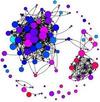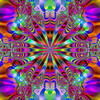| Sunday, July 6, 2008 |
| Laws of social networks |
| There are a few "laws" that typically are brought up when one discusses networks, particularly online social networks. They show a progression of different kinds of networks. They're not rules and they're not natural laws, but they're an abstraction of observations smart people have made about different types of networks.
First there's Sarnoff's Law. David Sarnoff was a big name in radio broadcasting. Around 1930 he formulated a law that said, essentially: 
The value of a network is proportional to the number of members He was talking about a broadcast network. Meaning a one-way emission of some program to a number of listeners or viewers. Sure, twice as many listeners is twice as good, if we're thinking about influence, advertising dollars, etc. Then we move on to a different kind of network where each node potentially might talk with any other node. Here is Metcalfe's Law: 
The value of a network is proportional to the square of the number of users of the system Here were talking about a telecom network. Think about a phone network. Anybody with a phone can call anybody else with a phone. So, the number of possible connections is much higher. It is the square of the number of nodes. Robert Metcalfe who formulated this law around 1970 was the inventor of the ethernet protocol for computer networks, and this applies to networks between computer users as well as it applies to telephones. But we can do better than that. Computer users can not just make calls or send e-mails. With proper software like forums and social networking sites, they can also get together and form groups. The number of theoretically possible groups is much higher than the number of connections between individuals. So, here comes Reed's Law:  The utility of large networks, particularly social networks, can scale exponentially with the size of the network. The utility of large networks, particularly social networks, can scale exponentially with the size of the network.This was formulated in 1999 by David Reed. This obviously applies to the Internet. So, we went from a potential value proportional to number of members in a broadcast network, to the square of the number of members in a telecom type network, to roughly 2 to the n'th power, in a group-forming network, where n is the number of members. This is all rather abstract and theoretical. We're only talking about potential maximum value, a potential which will never be met. In a phone network, most of the nodes wouldn't have the slightest interest in calling up the majority of the rest of the nodes. And on the Internet, most people would never want to participate in anything remotely like the number of groups that could be formed, as they wouldn't possibly have time, and their number of interests has not grown exponentially. I'd rather go in a somewhat different direction and formulate a law that both is more correct and just as useless. 
The value of a network is proportional to its complexity See, the real value doesn't really depend very directly on the number of nodes. Sure, the Internet is potentially more valuable if we add a lot of people to it, but in reality only if there's a meaningful way for you to have a direct or indirect relationship to them, or to draw value from what they're doing. But it is not the number that does it, it is the type of web that is woven. I'm talking about complexity in the sense of systemic properties where the parts somehow are inter-related in a way where the sum becomes more than just the total of the parts. Those types of networks above are special cases of this. A broadcast network is very simple and doesn't have much complexity. However, the real value of such a network doesn't really depend on just the number of viewers, as it depends on who they are and what the network is broadcasting. One network might easily be more valuable than another with the same number of members. The value of a telecom network isn't really n squared. It depends on which relationships people have outside the network. The more complex the relationships, and the more complex relationships the network facilitates, the more valuable it is. Everybody on the net aren't going to form groups with everybody else, so, again, the real value depends on the complexity of the relationships that it is meaningful to maintain. Something might increase it, but it isn't the number of members itself that is going to increase it. It is an easy claim to make, that the value of a network is proportional to its complexity, because complexity is badly defined and there's no way of measuring it. That doesn't make it less true. What increases the value is increased complexity in the sense that more intricate webs are woven in a way that is useful. Think about a brain. Neurons are connected with other neurons in a very complex way that creates a system ready to respond in useful ways to a great number of different situations. It isn't the number of neurons that's key, but the multitude of ways they're become connected, based on a multitude of learning experiences. Signals propagate and ripple across the network, useful responses emerge, and the system keeps learning and evolving. It isn't very valuable or useful to connect random people with other random people in random constellations. What is useful is that relationships form, based on shared interests or experiences, and that one is able to indirectly draw on the connections and knowledge of other people, through several steps. If you're in a social network, you've somehow become connected with people that you have something in common with. You've also connected yourself with resources that are useful to you, which have been created by people you probably don't know. These people and those resources are again connected with networks of people that again are connected with other people and other resources. If there's something you want to do, or something you want to know, there's an intricate web of connectedness available to you. Maybe what you're looking for isn't available from what you're directly connected to, but it might materialize from what you indirectly are connected to. You're connected with a complex network and exactly what is available is in no way obvious. But the value of it increases the more developed this network is, the more meaningful connections have been developed, the more those different resources are lined up, ready to go. Which is the complexity. The complexity can be increased. How to do so isn't generally clear or understood. How can one weave more useful, far-reaching connections, without merely making it all more complicated and confusing? There's no easy answer, but there are certain indicators. What you're looking for is the tools that appear to make things more simple, while actually connecting you with more stuff. Does it get things together for you, or does it fragment things for you? Is the network becoming smarter, or more confused? Are you seeing synergy emerging, or the opposite? [ Organization | 2008-07-06 23:20 | 4 comments | PermaLink ] More > |